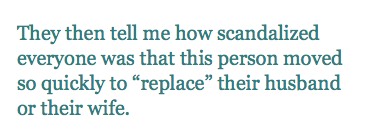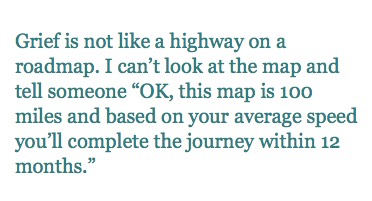by
How to navigate grief in a society that doesn’t really understand.
A few years ago I was getting my hair cut, and the woman cutting my hair asked if I was married. I told her I was and I was a newlywed. She kind of looked at me funny because people don’t expect someone fifty plus years old to be a newlywed. (Why? I guess there are some rules that only young people are newlyweds, I guess.) She asked if I was married before and I gently told her I was a widower. She asked about how long I had waited before I started dating again, and when I told her she was quite shocked. She them muttered to me in a quiet way, “I could never do that.” When I asked “Could never do what?” she said “Any of it.” It became clear she did not want to discuss it further. Somehow I had broken some rule in her values system. This reminded me of what I wrote about in my book The Sun Still Rises about the “rules” about grief.
I wanted to share with you society’s rules about grief, and what you can do to navigate around them. Yes, I know you already have enough stress and pressure dealing with grief, and now you have to deal with other people’s perceptions of what the rules are relating to grief. Why in our society are there very preconceived notions about the rules? My guess is that people are ill-informed about death, and are passing along what they have heard during their life as the rules. The reality is there are none.
Rule #1- There are rules. Somehow our society made determinations about exactly how a grieving person should conduct themselves at all times. If we expected other people to live by our pre-defined rules they would actually resent it. Yet for some strange reason it seems perfectly OK to tell a grieving person how to live. Hmm… One of the things that I find fascinating is that people often don’t realize they are dictating the rules—they’re just blindly following social “norms”.
The problem is—what is normal? Your loved one dying was not normal. Your loved one passing away tragically was not normal. Your loved one dying too young was not normal. Your loved one dying before her parents was not normal. Your loved one being killed in a tragic accident was not normal. So my point is that none of this is truly normal. It’s all well—just weird, and sometimes very surreal, like we are caught in a real-life nightmare. So I don’t know why people are trying to dictate norms for something that’s not normal! Rule breaker solution: So my suggestion for you about the rules is to ignore them all, except for rules that make sense to you and feel right. Don’t let other people dictate your life to you.
Rule #2- You must act in a certain way. I don’t know what way you’re supposed to act, but one of the things that I found fascinating (OK I admit, I’m a geek about studying human nature) was during the early days of my grief people were constantly watching how I grieved. Oh sure, I know people were worried and concerned about me which I very much appreciated. But some people said things to me that indicated they were carefully watching how I was grieving. Several people said something like “you seem to be doing really well.” Indicating they were almost surprised at how well I was doing. The mistake in their perception was they were only looking at how I was reacting on the outside—not at my internal emotions.I wish people would stop clinging to the stereotype of what a griever looks like and acts like. Rule breaker solution: So my advice to you on this rule is to simply be yourself and don’t worry about how you were supposed to or not supposed to act. If people want to misinterpret your actions as being inappropriate then that is their problem. This is you and your family’s time—not theirs.
Rule #3- Certain activities are not appropriate for someone who is grieving. Our society seems to have determined that certain activities are not appropriate for someone who is grieving. Now please don’t misunderstand what I’m saying. I’m not saying this idea applies to going to a party three days after losing a loved one. But what I am saying is people certainly judge what activities grieving people should or should not do, and also when they should do them. Often after my wife passed away I felt as if I was being confined in the house just sitting around staring at the four walls. After a good deal of thought and reflection I realized it was not good for me to stay stagnant. So I started going out to the mall to shop and going to art galleries to look at art and going to amusement parks. All of these activities were done yes—by myself. Often my cell phone would ring and the person on the other end would ask me what I was doing. I would tell them that I was shopping, or at an amusement park, or having dinner and getting ready to go to the movies.
There is even an implication at times that a person who is grieving and engaging in some activity is somehow being disrespectful to the  loved one who has gone. This could not be further from the truth and I find it to be offensive. Rule breaker solution: Ignore them. It’s their problem not yours. The bottom line is that it is up to you to decide at this point what is best for you. Listen to your heart and your instinct and it will tell you what feels right and what doesn’t. Unfortunately, friends, family, and acquaintances don’t necessarily know what’s best for you—just what would be “normal” under the circumstances.
loved one who has gone. This could not be further from the truth and I find it to be offensive. Rule breaker solution: Ignore them. It’s their problem not yours. The bottom line is that it is up to you to decide at this point what is best for you. Listen to your heart and your instinct and it will tell you what feels right and what doesn’t. Unfortunately, friends, family, and acquaintances don’t necessarily know what’s best for you—just what would be “normal” under the circumstances.
Rule #4- There is a right time to wait before dating. Wrong, wrong, wrong. Nothing is more ridiculous than that statement. As I discussed in an earlier chapter I decided to start dating about four months after my wife passed away. Please don’t pay too much attention to the four months. In my opinion it doesn’t matter whether it was four months or four years. There is no right answer because the answer is different for every single person.
I am a very loving person. I am and have always been a people person. As a result of my loss I felt extremely, devastatingly lonely, walking around an empty house without a loved one. Due to the guidance of my best friend and advice from other valued friends and family I decided when the right time was for me. I have had many friends and family members tell me stories of people from their church or from their neighborhood who have lost a loved one and have been remarried within one year. They then tell me how scandalized everyone was that this person moved so quickly to “replace” their husband or their wife. Rule breaker solution: So my advice on this rule is for you to determine what is right for you. No one else on the planet can tell you how you feel in your heart and your mind about the possibility of dating after you’ve lost a husband, wife girlfriend, or boyfriend. They can’t see inside of your heart, they can’t peer into your soul and know what you feel and believe. They can only go by what you tell them.
Rule breaker solution: Go out into the world of dating and seek joy and love. I also believe that finding joy and love and companionship will help you heal more quickly in the grieving process. Once you start dating—then people will also have preconceived notions about what you should and should not be doing. They will say you’re dating too soon, you are not dating soon enough, you’re dating too many people, and not enough people. Again, all of these decisions are up to you.
Rule #5- They have to give you permission. I felt in many cases as people were talking to me during the early days of my grief process that they were actually giving me permission. They would say things like “when you’re ready to start dating we will support you.” As if at 54 years old I needed permission to start dating. The reality is no one has to give you permission to do anything. If you have lost a loved one—what you do regarding your social life is completely up to you. You don’t need permission. Rule breaker solution) You don’t need to offer any more explanation about what you are doing, because you don’t have to get their permission because you are an adult.
Rule #6- There are certain things you have to do. My wife passed away in May and that following November my family in Virginia invited me to come for Thanksgiving. For lots of reasons I did not feel like going to Virginia and I did not feel like celebrating Thanksgiving. I wanted to stay home, I wanted some alone time to think and to work on the house. So I politely declined. When you’re grieving it is perfectly OK to choose whether or not to attend holiday functions. It’s OK to go to family get-togethers or not go to family get-togethers. At Christmas I did go to Virginia to celebrate with my family. Rule breaker solution: So aside from taxes and your job responsibilities, just remember that you don’t have to do anything—particularly when you are grieving. This is, in my opinion, the one time to stop worrying about other people’s feelings. It’s more important to take care of your own feelings during this difficult time.
Rule #7- You should or should not cry. This is by far the most misunderstood element in my opinion about grief. And there are so many odd rules that people have about crying. People, for example, think you should cry a lot in the early days of your grief and maybe not cry at all later into your grief. These are all just such ridiculous concepts it amazes me that we have to even address them, but we do. Crying is extremely therapeutic for releasing the pressure and stress of grief. I have noticed many times after a good, long cry that I felt much better and felt relieved.
 The other thing that’s interesting about crying is a lot of people don’t know how to handle a person who is crying. Particularly when they don’t expect it or it seems out of place. I have found in my grief process that I often would start crying when I expected it least. There would be a song that was playing on the radio, a scene in a movie or a TV show, and for some reason something that I heard or saw flipped the trigger that made me cry. I was fortunate that most times I cried, I was not in public. Rule breaker solution: I want you to give yourself permission to cry in public if it happens—and to not be embarrassed about crying. There is no reason to be embarrassed. It is a normal human function to cry when we are sad or when we are moved in some way. The only reason why crying may sometimes be embarrassing is because of people’s awkward reactions to the fact that you’re crying. For men who cry (even though I believe this is gradually changing in our society) there is an additional stigma attached to crying. Some men are raised with the philosophy that “boys don’t cry” and crying is a sign of weakness and or emotional vulnerability. Crying is not a sign of weakness and it certainly is a sign of vulnerability, but if you’re grieving you’re vulnerable—there is nothing wrong with that.
The other thing that’s interesting about crying is a lot of people don’t know how to handle a person who is crying. Particularly when they don’t expect it or it seems out of place. I have found in my grief process that I often would start crying when I expected it least. There would be a song that was playing on the radio, a scene in a movie or a TV show, and for some reason something that I heard or saw flipped the trigger that made me cry. I was fortunate that most times I cried, I was not in public. Rule breaker solution: I want you to give yourself permission to cry in public if it happens—and to not be embarrassed about crying. There is no reason to be embarrassed. It is a normal human function to cry when we are sad or when we are moved in some way. The only reason why crying may sometimes be embarrassing is because of people’s awkward reactions to the fact that you’re crying. For men who cry (even though I believe this is gradually changing in our society) there is an additional stigma attached to crying. Some men are raised with the philosophy that “boys don’t cry” and crying is a sign of weakness and or emotional vulnerability. Crying is not a sign of weakness and it certainly is a sign of vulnerability, but if you’re grieving you’re vulnerable—there is nothing wrong with that.
Rule #8- There is a time frame for grief and it’s officially one year. I have heard people talk about someone who is grieving, and say that they have been grieving for ten years and still cry every day. Is that wrong? It’s not up to me to say; everyone grieves in a different time frame. On the other hand I’ve had people who have insinuated that I was not spending enough time on my grief, and suggested that I was maybe moving forward a little too quickly. Now they did not say it in those words, but they insinuated or hinted around about it. I got the message loud and clear. There is no time frame for grief, and there is no time frame for getting over it because you don’t get over it. You learn to accept it, but only because you don’t have a choice. I will say that if someone is struggling after a great deal of time, and are having difficulty just in managing their life because they are crying and massively depressed then they may want to seek help in the form of a grief counseling group or individual counseling with a mental health professional.
Grief is not like a highway on a roadmap. I can’t look at the map and tell someone “OK, this map is 100 miles and based on your average speed you’ll complete the journey within 12 months.” There is no road, there is no map, and there has been a wreck, so no one can say how long the journey is going to take. The other question is what do we mean by a timeframe for grief? That would mean that at some point the grief is totally and completely over, for us never to have another sad feeling again about the loss of a loved one. That, of course, is an absurd concept and will never happen. I find that even though I have healed very nicely in 22 months, there are still days where I see something or hear something or read something, and it makes me sad, because it reminds me yet again of my tragic loss. Rule breaker solution: Take your time—it’s all up to you.
Complete Article HERE!

